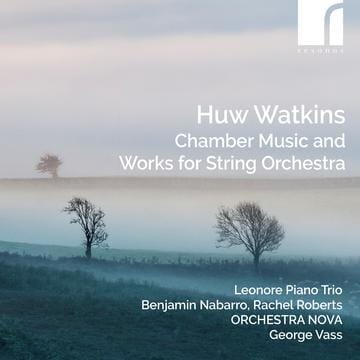
We met Huw Watkins (seen by some as the leading Welsh composer of his generation) at Milton Court recently, for the World Premiere of his Horn Concerto. That was not Classical Explorer’s first reportage of Watkins, however: in 2022, we reported on his “Resurrection often Soldiers” from Spenser Pieces (inspired by Deserted Perch, 1949).
Watkins is himself a pianist. The works presented here span between 2009 and 2022l the Piano Trio No. 1 is the earliest (and was premiered at Wigmore Hall in 2009). The first movement works for a gentle beginning to virtuoso writing for piano (the superb Tim Horton, who also played in that Sheffield concert). Benjamin Nabarro (violin) and Gemma Rosefield (cello).The movement also contains music of real beauty:
The move to the central Lento is smoothly made. Nabarro’s sweet violin in its upper register is particularly impressive here, and Watkins’ music is often very, very beautiful: a beauty that can find itself in some tortured spaces:
The finale is utterly remarkable, a crazed whirligig of frenzied movement. When strings calm to sustained chords, the piano’s figuration is delivered with stunning delicacy by Horton. There is something of a dance about that opening (a jig, perhaps), which is traditionally perfectly in keeping with a finale, and yet Wakins cranks up the emotions associated with it to feverish pitch. At times the music seems to roil like a threatening sea. This is the strongest movement of the piece, and is heard in a terrifically exciting performance. the true spirit of chamber music is here: in the razor reactions and the exchanges between instruments, the members of the Leonore Piano Trio reveal themselves as masters of their craft.
The Little Symphony is scored for spring orchestra and dates from 2013. It is cast in one quarter-hour movement. A result of Watkins’ time as Composer-in-the-House (!) with The Orchestra of the Swan, it was that orchestra who gave the premiere in Stratford-upon-Avon. Here, it is Orchestra Nova with George Vass, an ensemble which makes the most of the core contrasts of this piece, between energy/rest, between energy and nostalgia. The piece rests in the tradition of English pastoral sting pieces, a fine example of its kind. George Vas’s inspires his players to a phenomenal combination of exactitude of execution and deep feeling born of a profound understanding of Watkins’ structure:
George
There’s also a performance, a little fleeter, by the original performers, the Orchestra of the Swan (the web notes that go along with this performance expand nicely on the piece; well worth a read):
Th short (nine-minute) Piano Quartet, commissioned by the Schubet ensemble and Spitalfields Music’s New Music Commission Fund, tells its story concisely, moving from peace to strident rhythmic verve and back again in its short span. But in that time, Watkins creates a completely convincing musical field in which teh drama can play out; here, the Leonore Piano Trio is joined by Rachel Roberts on viola, giving teh string contribution that much extra depth (as well as an extra contrapuntal line to play with). The performance here is exemplary, Horton’s finger work sublime. The way the performers capture the very essence of Watkins’ world is surely the most impressive aspect, though:
The final two works are both associated with the Prestaigne Festival. The Concertino (2011) is scored for violin (here Benjamin Nabarro) and strings (Orchestra Nova again, with Vass); the soloist at the premiere was Tamsin Waley-Cohen. One again, we are presented with a one-movement span, here divided into various sections and closing with a lament. Nabarro is a finely expressive soloist in what is a work fo great beauty:
The Concerto stands in high contrast to Watkins’ Violin Concertos heard at the Proms in 2012 with the BBC Symphony Orchestra under Edward Gardner. The following video gives an idea of the difference (the excerpt is incredibly punchy and exciting); you can find Spotify and iDagio links to the NMC release of that performance (part of an all-Watkins disc) at the end of today’s post:
Finally, the Piano Trio No. 2 (2022), written for Presteigne’ Festival’s 40th anniversary. It was the Leonore Piano Trio who premiered the work on that occasion (the commission was actually Presteigne Festival, Wigmore Hall and Music in the Round); George Vas’s is the dedicatee. The piece strikes me as haunting and beautiful, with some impressive dark shadows, and these ae just the performers to create the perfect :
The disc is available on Amazon here; Spotify and iDagio below. The NMC disc of Watkins’ Violin Concerto. Flute Concerto and Symphony is available from Amazon as a download here; Spotify below.










